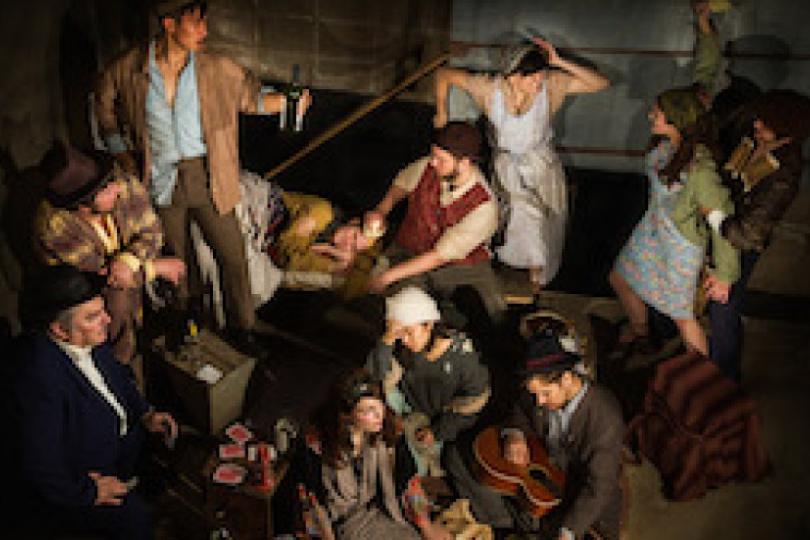Editor's Note: For the last four years, we've honored the new theater season with a look back at what made for great work in the past theater season. If you enjoy what you read here, please help us pay for more great writing by joining our Indiegogo campaign.
The past few months have been rough in the world. There’s no escaping it. I remember when my Facebook news feed was full of cat videos and the results of Buzzfeed quizzes; now, even my most oblivious friends are posting articles about police brutality and commentaries on the situation in Gaza.
But it isn’t just this summer that we’ve been facing bad news. Last winter, all we talked about was the polar vortex hitting Minnesota. Even further back, you couldn’t get away from debates over the disastrous rollout of the health care exchange or endless coverage of the government shutdown over its failure to deal with the budget. One new conflict at a time, this year has been making us think about dire, important things like climate change, racism, and large-scale political conflict. What a drag.
In a harsh world like this, for many of us, the best we can do is tread water. In the theater community, I saw a lot of companies continue to do the same types of good theater that they have always done. And I certainly won’t complain about talented, hard-working people putting on engaging shows. But in a year when I could turn on MPR to get my daily dose of sobering reality, my theatrical choices tended to gravitate toward the magically innovative fantasies that pulled me out of the doldrums.
This began back in October with
The Wong Kids and the Secret of the Space Chupacabra Go!, a mouthful of a title at the Children’s Theatre Company that featured space monsters and a jungle gym set (by Meredith Ries) that I wanted to play on. In February, I was pleasantly surprised by the Kneehigh’s playful production of
Tristan & Yseult at the Guthrie, which had a quirky and poignant anti-Wagnerian take on the medieval tale. In April came another British production, this time at the Minnesota Opera, where a new staging of
The Magic Flute transplanted classical opera into the world of silent movies with an Edward Gorey aesthetic. And in August, I was whisked away by Circus Juventas’s
Neverland, an atmospheric and imaginative showcase of young performers doing Cirque du Soleil-style stunts.
(As a brief aside: all four of these productions are either from out of town or meant for kids. Have our local artists caught the same case of the blues that I did?)
Plays on heavier subjects
There were, of course, some innovative and emotionally powerful productions this year that tackled heavy subjects, such as Michael Milligan’s one-man powerhouse performance about the healthcare system in
Mercy Killers at Pillsbury House Theatre, or
The Veterans Play Project, a co-production of Mixed Blood Theatre and Footprints Collective (now
Wonderlust Productions), which – being partially written and acted in by actual veterans – felt necessary and provocative in spite of its less polished performances. But next to the many companies this year who earnestly staged political truths in modern settings, the Nimbus Theater’s Depression-Era adaptation of Maxim Gorky’s
The Lower Depths stood out for its unflinching and nuanced look at issues like joblessness and poverty through the lens of a century-old source text.
First and foremost, it was a bold and surprisingly savvy choice to stage a work of Russian socialist realism in the middle of the Christmas season. When our world becomes too complicated to be cured by Santa and consumer spending, it’s nice to have a theater company sweep in and embrace the gritty ambiguities that so many of us are trying so hard to ignore.
There are so many ways that show could have gone wrong: the massive cast could have been too unwieldy, Gorky’s discourses on morality too long, or the tone too bleak for a holiday-weary audience. But the production worked not only because of its internal coherence, but because it captured something that I think many of us have been feeling all along: that for all the issues we see and consciousness-raising we do, there isn’t really a good solution to any of it (and yet that doesn’t stop us from trying to find one).
Attention to detail
Director Josh Cragun set his adaptation of
The Lower Depths in a basement-level tenement, and Zach Morgan’s set design set the tone for the production right away. In the same way that a person’s house can tell you about both their individual tastes and their place in the world, each character’s bunk was a unique reflection of his or her personality and social standing. A carefully chosen assortment of patched blankets and damaged personal items indicated professions and personal values, while the arrangement of the sleeping areas mirrored the characters’ hierarchies and theatrical functions. Nothing in this staging was arbitrary; with characters stacked one on top of another and tucked into corners, we could see their social relationships embodied in space.
This was theatrical design at its best, creating a multi-layered world with visual interest, theatrical purpose, and sociological insight. And while the production’s attention to detail began with the set, it did not end there. Gorky’s rich assortment of characters all represent different sides of a debate, whether about the ethics of stealing, the role of the artist, or the plight of the single woman. Any one of these arguments could have come across as heavy-handed, were it not for the vivid performances of the entire ensemble, who created recognizable portraits of flawed individuals struggling to survive with limited means. In the end, these insightful characterizations built a much stronger argument about economic inequality than any Marxist tract could have done.
Though you could never call it
fun to watch a group of people slowly resign themselves to a life of poverty and disappointment,
The Lower Depths promoted a rare and exciting level of intellectual and ethical engagement with its source material. While it didn’t have the acrobatic flash of
Neverland or the high-tech visuals of
The Magic Flute, The Lower Depths presented a change of perspective on a much deeper level. In the current political climate, we are so frequently urged to pick a side that it was refreshing to be presented with an opportunity to refuse to choose, recognizing that while some options may be lesser evils, very few will truly solve our problems.





